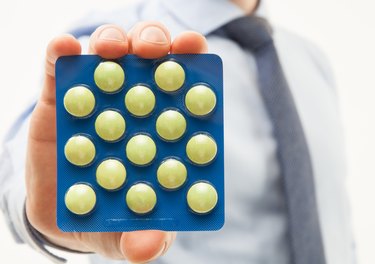
Dehydroepiandrosterone, or DHEA, is a hormone that is produced in the body by the adrenal gland, reports Medline Plus. The body naturally produces DHEA for vital hormonal function. In men, DHEA levels begin to decrease steadily after the age of 30. DHEA supplement use is not recommended without the supervision of a licensed physician.
Identification
Video of the Day
DHEA is also a precursor to other hormones in the body and it can convert into androgen and estrogen. DHEA can be taken orally in a capsule or tablet form or applied topically in a concentrated cream.
Video of the Day
Effects
As a precursor to certain hormones, DHEA has been reported by Medline Plus to improve quality of life, sex drive, and hormone levels in men with insufficient adrenal function. However, additional clinical studies are needed in order to accurately support those claims. A study published in the Clinical Endocrinology Journal studied the effect of DHEA supplements on elderly men over 65 years of age. The results reported that DHEA increased cGMP, an indicator of nitric oxide production, and plays a protective role against cardiovascular disease. The men also reported increases in testosterone levels and decrease cholesterol levels from DHEA. Another clinical study in the Journal of Atherosclerosis reported an inverse relationship with DHEA and atherosclerosis, or hardening of the arteries. The results found that healthy DHEA levels in men may be associated with atherosclerosis prevention.
Effective Dosage
Research studies have reported effective doses from 25 to 200 mg of DHEA per day for up to one year. A topical cream containing 5 to 10 percent DHEA has also been studied and effective for up to four weeks.
Drug Interactions
Individuals diagnosed with diabetes should be monitored by a physician while taking DHEA because it has been reported to effect blood sugar levels. DHEA may increase blood clotting and cause drug interactions with patients taking anticoagulants or anti-platelet medication, according to Medline Plus. Men who take drugs for thyroid disorders, high cholesterol and endocrine abnormalities should also consult their physician before taking DHEA.
Adverse Effects
Oral DHEA supplementation at recommended doses have been reported to have very few side effects, according to Medline Plus. The most common side effects of DHEA in men include nasal congestion, acne, headache, irregular heartbeats and fatigue. Male users have reported some hormonal side effects like breast tenderness, testicular wasting, aggressiveness and gynecomastia. DHEA supplementation may increase the risk of prostate cancer and alter thyroid hormone levels and adrenal function in some men.